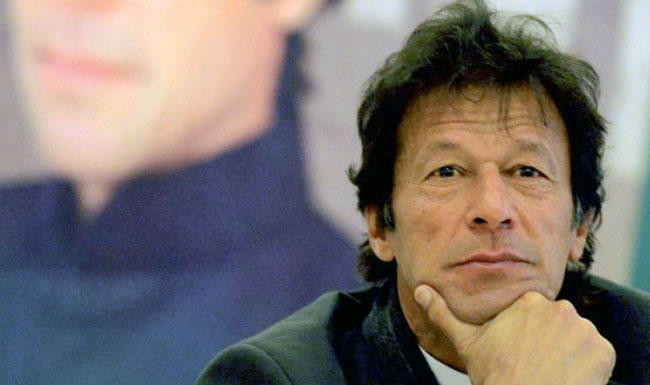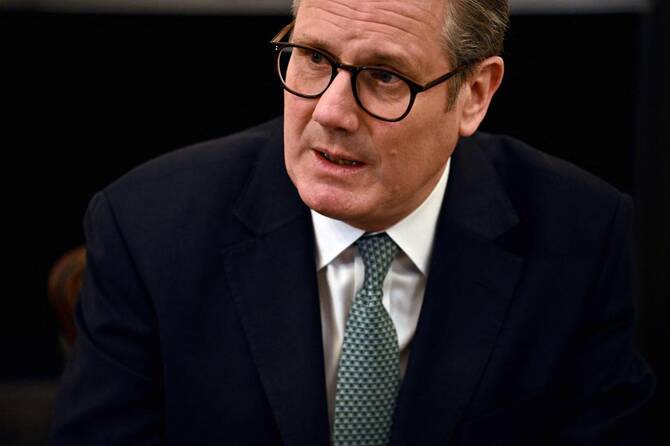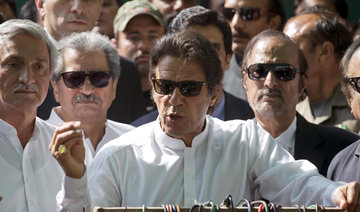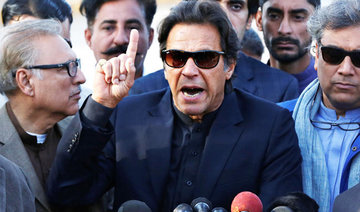ISLAMABAD: Clad in a tracksuit and ankle weights, Imran Khan lounges in a plush chair and announces this is his political moment: the World Cup cricket champion believes power in Pakistan is his for the taking.
After years in the wilderness the former all-rounder is riding a wave of populism as rival parties stumble, decrying the venality of Pakistan’s political elite and promising an end to rampant corruption if he can win a general election due this year.
Often likened to US President Donald Trump for his populist flair and Twitter tirades, he prefers to draw parallels with former US presidential hopeful Bernie Sanders or British opposition leader Jeremy Corbyn.
“It is one of the most ridiculous comparisons,” he sighs, when asked about Trump during an interview at his hillside home near Islamabad.
But despite once describing a potential meeting with the US president as a “bitter pill,” Khan says he would be prepared to work with Trump to stop the “insanity” in Afghanistan.
“This war will only end through talks,” he says. “The solution does not lie in more bombs and guns.”
In the West, the man who led Pakistan’s 1992 World Cup champion cricket team is typically seen through the prism of celebrity, with memories of his headline-grabbing romances and playboy reputation standing out.
Back home, the 65-year-old cuts a more conservative persona as a devout Muslim, often carrying prayer beads and nurturing beliefs in living saints.
To his legions of fans, Khan is uncorrupted and generous, spending his years off the pitch building hospitals and a university.
“(He) deserves a chance over all the other leeches,” says supporter Shahid Khan, a 26-year-old engineer.
But Khan is also described as impulsive and brash, too tolerant of militancy and fostering close links to Islamists, amid speculation over his ties to Pakistan’s powerful military establishment.
Khan entered Pakistan’s chaotic politics more than two decades ago promising to fight graft and build a welfare state in the nation of over 200 million.
But for his first 15 years as a politician he sputtered, his Pakistan Tehreek-e-Insaf (PTI) party never securing more than a few seats in the national assembly.
“Sports teaches you that life is not in a straight line,” he says.
“You take the knocks. You learn from your mistakes.”
In 2012 PTI’s popularity surged with hordes of young Pakistanis who grew up idolizing Khan as a cricket icon reaching voting age.
The wave of youth support accompanied festering dissatisfaction among the middle class with the country’s corrupt and dynastic political elite.
Khan admits his party was ill-prepared to capitalize on the gains in time for the 2013 election.
But that was then. “For the first time, we’ll be going into elections prepared,” he says of 2018.
He points to his party’s governance of northwestern Khyber Pakhtunkhwa (KP) province as a blueprint for nationwide programs focusing on human development.
Rahimullah Yusufzai, a veteran journalist based in KP’s capital Peshawar, says the party has done well on legislation — but implementation has been slow, as PTI grapples with inexperienced political newcomers and indiscipline.
“He has been there for more than four and half years,” Yusufzai says. “People are trying to figure out, what change did he bring?“
Others fear Khan’s mercurial nature is unsuited to being prime minister.
Last month he made headlines after asking his supporters in a tweet to pray he finds “personal happiness which, except for a few years, I have been deprived of,” following still unverified claims he had married his spiritual adviser.
“Imran Khan is very, very impulsive — a trait leaders score low on,” says Harris Chaudhry, a 23-year-old student.
Detractors have also attacked Khan for his repeated calls to hold talks with militants and for his party’s alliance with Sami ul Haq, the so-called Father of the Taliban whose madrassas once educated militant supremos Mullah Omar and Jalaluddin Haqqani.
Khan defends the partnership, saying Haq is instrumental to reform and helping poor students at risk of being radicalized in Pakistan’s long war on extremism.
To his opponents, he is merely latching on to a groundswell of naked populism.
“Imran Khan is right now the beneficiary of a wave of celebrity politicians who are anti-politicians,” explains Husain Haqqani from the Washington-based Hudson Institute, suggesting Khan has also benefited from ties with the military, whose penchant for meddling in Pakistani politics is well known.
Still, many believe this is the best political opportunity Khan will ever have.
His arch nemesis Nawaz Sharif was ousted from the premiership in July, leaving the ruling Pakistan Muslim League-Nawaz in disarray; while the once mighty Pakistan People’s Party has wilted into a shell of its former self.
This election, Khan says, is PTI’s “biggest chance” at victory, even as doubts reverberate after his party lost a by-election this week.
But when asked if, should he lose, would he hand over the party leadership to a successor, Khan is cryptic.
“I’m the only cricket captain in our history who left when he still could have been the captain,” he says.
First the world, now Pakistan: Imran Khan seeks election glory
First the world, now Pakistan: Imran Khan seeks election glory

Zelensky meets European military leaders to plan for a peacekeeping force

- UK Ministry of Defense said that officials addressed the structure, size and composition of any future “reassurance force”
- Britain has been promoting the idea of a European-led peacekeeping force for Ukraine
KYIV: Ukrainian President Volodymyr Zelensky met the leaders of the British and French armed forces in Kyiv Saturday to discuss the potential deployment of a multinational peacekeeping force to Ukraine, despite the reluctance of US President Donald Trump to provide security guarantees.
The UK Ministry of Defense said that officials addressed the structure, size and composition of any future “reassurance force,” while the chief of the defense staff, Adm. Antony Radakin, emphasized that the UK would look to “build on the formidable capabilities of the Ukrainian army and put them in the strongest possible position to deter Russian aggression.”
The weekend discussions are planned to set the ground for a further meeting between defense ministers in Brussels and the Ukraine Defense Contact Group on Friday.
Britain has been promoting the idea of a European-led peacekeeping force for Ukraine in the event of a ceasefire but it has said such a force needed a US “backstop” to make it credible in the face of possible Russian reprisals.
Building a force big enough to act as a credible deterrent — UK officials have talked about possibly 10,000 to 30,000 troops — would be a considerable effort for nations that shrank their militaries after the Cold War but are now rearming.
Trump, who has been pushing for a ceasefire in the war in Ukraine, temporarily paused military aid to Kyiv and has repeatedly said that the country will never join the NATO military alliance.
Sri Lanka, India forge defense, energy ties during Modi’s visit

- Indian leader awarded island nation’s highest civilian honor
- Sri Lanka, India, UAE agree to build energy hub in Trincomalee
Colombo: Indian Prime Minister Narendra Modi received a ceremonial guard of honor in Colombo on Saturday as his delegation signed energy and defense agreements with Sri Lanka, where New Delhi competes with China for greater influence.
Sri Lankan President Anura Kumara Dissanayake rolled out the red carpet for Modi and welcomed him with a 19-gun salute in the capital’s Independence Square.
He also conferred Sri Lanka’s highest civilian honor, Mithra Vibhushan, on the Indian prime minister.
“This prestigious honor, which was introduced in 2008, is conferred upon heads of states and government for their friendship, and honorable Prime Minister Modi highly deserves this honor. That is what we firmly believe,” Dissanayake said during a joint press conference with Modi, after the two countries signed seven cooperation agreements.
Modi arrived in Sri Lanka on Friday evening from Thailand, where he participated in the annual summit of BIMSTEC, a regional grouping of the seven countries on the Bay of Bengal.
He is accompanied by External Affairs Minister S. Jaishankar, National Security Adviser Ajit Doval, and Foreign Secretary Vikram Misri, who signed agreements on defense cooperation, information and technology sharing, and energy imports and exports with the Sri Lankan government.
Another energy deal was signed between India, Sri Lanka, and the UAE on cooperation in the development of Trincomalee port as an energy hub.
“We welcome the important agreements made in the area of defense cooperation. We have also agreed to work together on the Colombo security conclave and security cooperation in the Indian Ocean,” Modi said.
“The agreement reached to build a multiproduct pipeline and to develop Trincomalee as an energy hub will benefit all Sri Lankans. The Grid Inter-Connectivity Agreement between the two countries will create opportunities for Sri Lanka to export electricity.”
The Indian prime minister is the first foreign head of state to visit the island nation since Dissanayake and his leftist alliance swept last year’s presidential and parliamentary elections.
The visit comes as Colombo balances ties with India, its powerful neighbor, and China, its biggest lender, which at the same time is India’s main regional foe.
Dissanayake’s first foreign visit as president was to New Delhi in December, followed by a visit to Beijing in January, highlighting Sri Lanka’s careful diplomacy between the two powers.
“Within the Indian subcontinent and Chinese belt, Sri Lanka is caught as a strategic island — not only in the Indian Ocean — between these two giants,” historian and analyst Dr. B.A. Hussainmiya told Arab News.
“Their geopolitical interest is centering in the Indian Ocean and in the Himalayas, so Sri Lanka, being a very small country, cannot hold its strength unless it creates a balanced and nuanced diplomatic approach between these two powers to keep it afloat in the system.”
UK’s Starmer and France’s Macon share concerns over tariff impacts

- The prime minister and president agreed that a trade war was in nobody’s interests
LONDON: British Prime Minister Keir Starmer and French President Emmanuel Macron shared their concerns over the economic and security impact of US President Donald Trump’s tariffs when they spoke on Saturday, Starmer’s office said.
“They agreed that a trade war was in nobody’s interests, but nothing should be off the table,” the statement from Downing Street said.
“The prime minister and president also shared their concerns about the global economic and security impact, particularly in Southeast Asia.”
The pair agreed to stay in close contact over the coming weeks.
China to US: ‘Market has spoken’ after tariffs spur selloff

- State-run Xinhua news agency also published the Chinese government’s stance, saying the US should “stop using tariffs as a weapon to suppress China’s economy and trade“
- “The market has spoken,” Chinese foreign ministry spokesperson Guo Jiakun said
BEIJING: China said on Saturday “the market has spoken” in rejecting US President Donald Trump’s tariffs, and called on Washington for “equal-footed consultation” after global markets plunged in reaction to the trade levies that drew Chinese retaliation.
State-run Xinhua news agency also published the Chinese government’s stance, saying the US should “stop using tariffs as a weapon to suppress China’s economy and trade.”
Hong Kong Financial Secretary Paul Chan told public broadcaster RTHK, however, Hong Kong would not impose separate countermeasures, citing the need for the city to remain “free and open.”
“The market has spoken,” Chinese foreign ministry spokesperson Guo Jiakun said in a post on Facebook on Saturday. He also posted a picture capturing Friday’s falls on US markets.
Trump introduced additional 34 percent tariffs on Chinese goods as part of steep levies imposed on most US trade partners, bringing the total duties on China this year to 54 percent.
Trump also closed a trade loophole that had allowed low-value packages from China to enter the US duty-free.
This prompted retaliation from China on Friday, including extra levies of 34 percent on all US goods and export curbs on some rare earths, escalating the trade war between the world’s two largest economies.
Global stock markets plummeted following China’s retaliation and Trump’s comments on Friday that he would not change course, extending sharp losses that followed Trump’s initial tariff announcement earlier in the week and marking the biggest losses since the pandemic. For the week, the S&P 500 was down 9 percent.
“Now is the time for the US to stop doing the wrong things and resolve the differences with trading partners through equal-footed consultation,” Guo wrote in English on Facebook.
In a separate statement published by state-run Xinhua news agency, the Chinese government urged the US: “Stop using tariffs as a weapon to suppress China’s economy and trade, and stop undermining the legitimate development rights of the Chinese people.”
“China has taken and will continue to take resolute measures to safeguard its sovereignty, security and development interests,” said the government.
Washington “seriously undermines the rules-based multilateral trading system, and seriously undermines the stability of the global economic order,” it added.
Earlier on Saturday, several industry chambers of commerce ranging from those representing traders in metals and textiles to electronics, issued statements condemning the tariffs.
China’s chamber of commerce, representing traders in food products, called on “China’s food and agricultural products import and export industry to unite and strengthen cooperation to jointly explore domestic and foreign markets.”
Hong Kong’s Chan said it strongly opposes Trump’s actions and would continue to be “free and open.”
“Allowing a free flow of capital and acting as a free port are our advantages, and this will not change,” Chan told public broadcaster RTHK.
“The rules-based multilateral trading system is our core,” he said.
UN calls for Myanmar support as quake death toll reaches 3,354

- “The destruction is staggering. Lives lost. Homes destroyed. Livelihoods shattered. But the resilience is incredible,” Fletcher said
- Myanmar’s neighbors, such as China, India and Southeast Asian nations, are among those that dispatched relief supplies and rescuers
BANGKOK: The United Nations called for the world to rally behind quake-hit Myanmar on Saturday as the death toll rose to 3,354.
In addition to those killed by the March 28 earthquake, 4,850 people were injured and another 220 are missing, state media said.
During a visit to Myanmar’s second-biggest city, Mandalay, which was near the epicenter of the 7.7 magnitude quake, United Nations aid chief Tom Fletcher appealed for international support.
“The destruction is staggering. Lives lost. Homes destroyed. Livelihoods shattered. But the resilience is incredible,” he said in a post on X. “The world must rally behind the people of Myanmar.”
Myanmar’s neighbors, such as China, India and Southeast Asian nations, are among those that dispatched relief supplies and rescuers to aid the recovery effort in quake-hit areas that are home to about 28 million people over the past week.
The United States, which was until recently the world’s top humanitarian donor, had pledged at least $9 million to Myanmar to support earthquake-affected communities, but current and former US officials say the dismantling of its foreign aid program has affected its response.
The UN Office of the High Commissioner for Human Rights said on Friday the junta was restricting aid supplies to quake-hit areas where communities did not back its rule.
The UN office also said it was investigating 53 reported attacks by the junta against opponents, including air strikes, of which 16 were after the ceasefire was declared on Wednesday.
A junta spokesman did not respond to calls seeking comment.
Free Burma Rangers, a relief group, told Reuters on Saturday that the military had dropped bombs in Karenni and southern Shan states on Thursday and Friday despite the ceasefire announcement, killing at least five people.
The victims included civilians, according to the group’s founder, David Eubank, who said there had been at least seven such military attacks since the ceasefire.
ELECTION PLANS
The leader of the military government, Senior General Min Aung Hlaing, reaffirmed to Indian Prime Minister Narendra Modi the junta’s plans to hold “free and fair” elections in December when the two met in Bangkok, Myanmar state media said on Saturday.
Min Aung Hlaing made the rare trip to attend a summit of South and Southeast Asian nations on Friday, where he also met separately with the leaders of Thailand, Nepal, Bhutan and Sri Lanka.
Modi called for the post-quake ceasefire in Myanmar’s civil war to be made permanent, and said the elections needed to be “inclusive and credible,” an Indian foreign affairs spokesperson said on Friday.
Critics have derided the planned election as a sham to keep the generals in power through proxies.
Since overthrowing the government of Nobel laureate Aung San Suu Kyi in 2021, the military has struggled to run Myanmar, leaving the economy and basic services, including health care, in tatters, a situation exacerbated by the earthquake.
The civil war that followed the coup has displaced more than 3 million people, with widespread food insecurity and more than a third of the population in need of humanitarian assistance, the UN says.




















